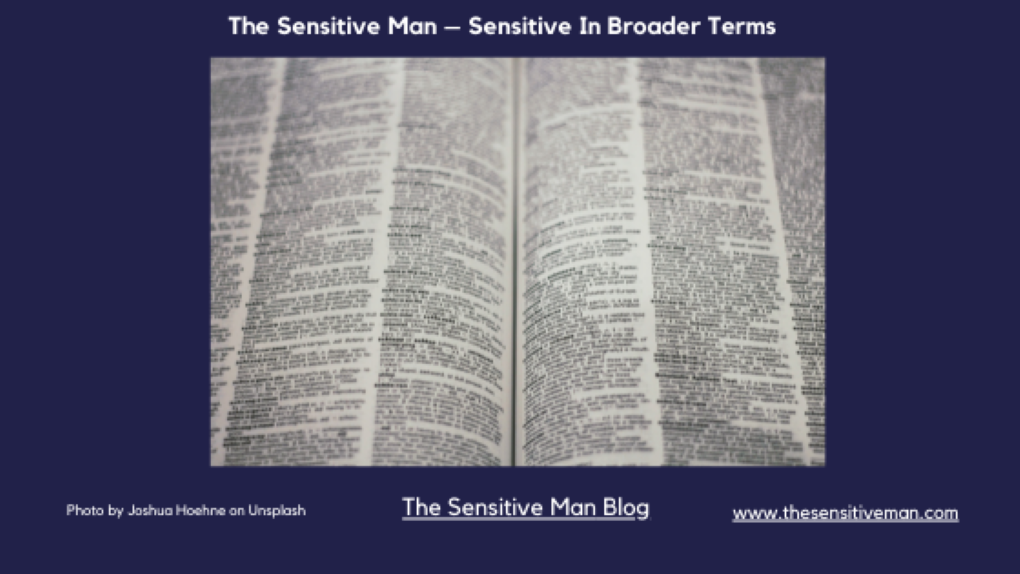|
A Blog about Sensory Processing Sensitivity from the Worldview of a High Sensing Male
In this article, I’m going to have some fun with prefixes. None of the words I’ll be talking about currently exist. Likewise, there is no evidence that any of the derivations of sensitivity exist or have been identified and named. This word exercise is just some experimental fun in word creation. Who knows, maybe someday these descriptors will be a thing. Please take this in the same spirit it is offered. In the past, I have described the various levels of sensitivity. (see Blog) The idea that sensitivity falls on a spectrum has gained traction lately with the Flower Metaphor. To quickly summarize, those individuals with the highest levels of environmental sensitivity are classified as Orchids, corresponding to the particular environmental requirements that Orchids thrive in. Next, we have Tulips, a hardier plant representing the vast middle of the sensitivity spectrum. Finally, we have the Dandelions, the least environmentally sensitive individuals, yet the sturdiest. But can we get even more granular than that? Yes, I think, with a little imagination, we can delineate even more types of sensitive folks. So take this commentary for what it is, part tongue in cheek and part quasi-scientific. The Broader Spectrum of Sensitivity In this post, we continue to elaborate on the sensitivity spectrum. Sensitivity applies to all humans. It is a human characteristic. To be more precise, we term high sensitivity at the top end of the sensitivity spectrum, the top twenty percent of the range. Can we account for some deviations of sensitivity not yet named? Does that add more gradation points on the spectrum? Using common prefixes and attaching them to our base word of sensitive, can we fine-tune even further the sensitivity curve to account for some uncommon types of sensitivity? Let’s see. How about the term – Asensitive? According to Webster’s the use of the a- prefix turns the term it precedes into not or without {term}. In the case of our exercise, would an asensitive person not be sensitive? Or could it be a highly sensitive person who removes themselves from the environment so as not to be sensitive? These individuals might be sensitive averse. They might display avoidant behavior to overwhelm, overstimulation, or withdraw simply to avoid too much sensory stimulation. How would you describe an asensitive person? What about the term Unsensitive? This term is not to be confused with insensitive, also called rude or cold. An unsensitive person would be, according to our word building lexicon, a person who would be the opposite of a sensitive person. It could mean the person was removed from being sensitive or ceased to be sensitive. For example, would a narcissistic person be unsensitive? Would an unsensitive person be described as thick-skinned? As opposed to the thin-skinned, highly sensitive person? Is an unsensitve person less focused on others (agentic) and a sensitive person more communally focused? Would unsensitive persons be genetically predisposed to being less empathetic? Does unsensitive correspond to the term unempathetic? What do you think? Could there be a term like Dis-sensitive? If so, what would be the difference between an unsensitive person and one that is dissensitive? One distinction might be that unsensitive people can be negatively sensitive and sometimes even hypersensitive as long as the stimulus is directed directly to them or about them. For example, even narcissists can be sensitive to criticism. Yet unsensitive people are still not able to be empathetic to others. The dis- or dys- prefix added to our term sensitive would imply that deprivation of sensitivity might be at play. Or perhaps a deliberate or constructed absence of sensitivity. Dissensitive people might be unaffected by their sensitivity either by mental health issues or sometimes a type of personal choice to simply not show any sensitivity to the environment, perhaps because of an extreme environmental upbringing. Kind of an artificial boundary issue in the extreme. And finally, what the heck would auto sensitive be? Here’s one we could have a lot of fun with. Adding auto to our root word might make this person self-taught on sensitivity or imply some type of automatic behavior regarding sensitivity. This might be someone who has learned to be sensitive beyond their normal place on the spectrum, hypersensitive or even highly sensitive. This individual may not normally be highly sensitive but uses elevated sensitivity to garner attention because it creates a reaction. Or maybe they have histrionic personality disorder, and it appears they are extremely sensitive to everything. Or is this even possible? Okay, so this little exercise has been fun. As more research comes out about sensory processing sensitivity, we’ll learn more about the trait and even some of the differentiation patterns. It may add even more granularity to the spectrum and cast light on deviations of normal sensitivity. Perhaps some words/terms will be used, but with more refinement. It may never look exactly like this or even at all, but I do believe at some point, we will start to see more detailed typology within the HSP community. What other terms might you use in describing sensitivity? Jot them down in the comments section. Please share your thoughts in the comment section.
0 Comments
Leave a Reply. |
AuthorBill Allen currently lives in Bend, Oregon. He is a certified hypnotist and brain training coach at BrainPilots.com. He believes that male sensitivity is not so rare, but it can be confounding for most males living in a culture of masculine insensitivity which teaches boys and men to disconnect from their feelings and emotions. His intent is to use this blog to chronicle his personal journey and share with others. Archives
July 2024
Categories
All
|


 RSS Feed
RSS Feed
